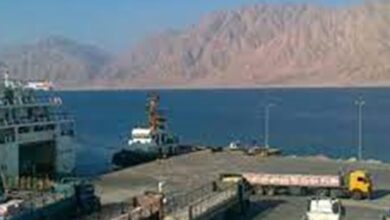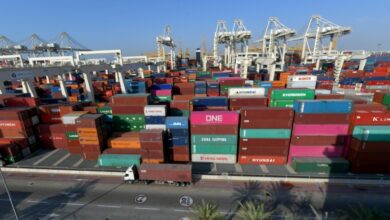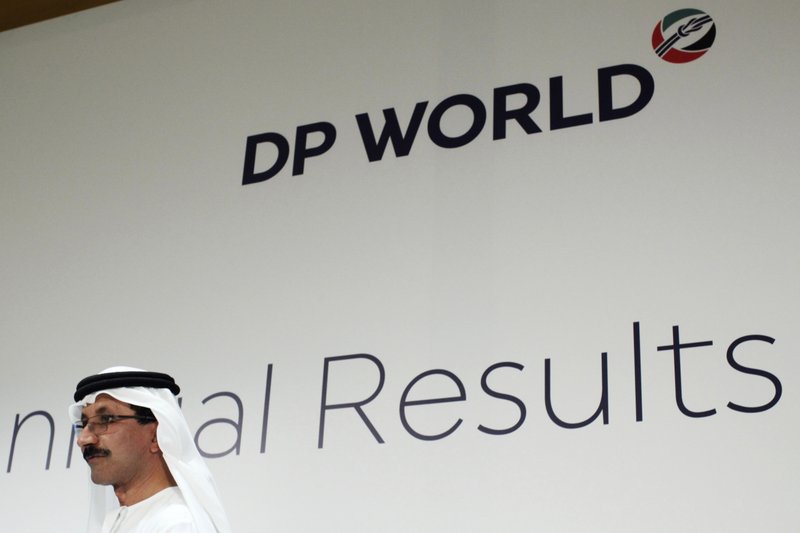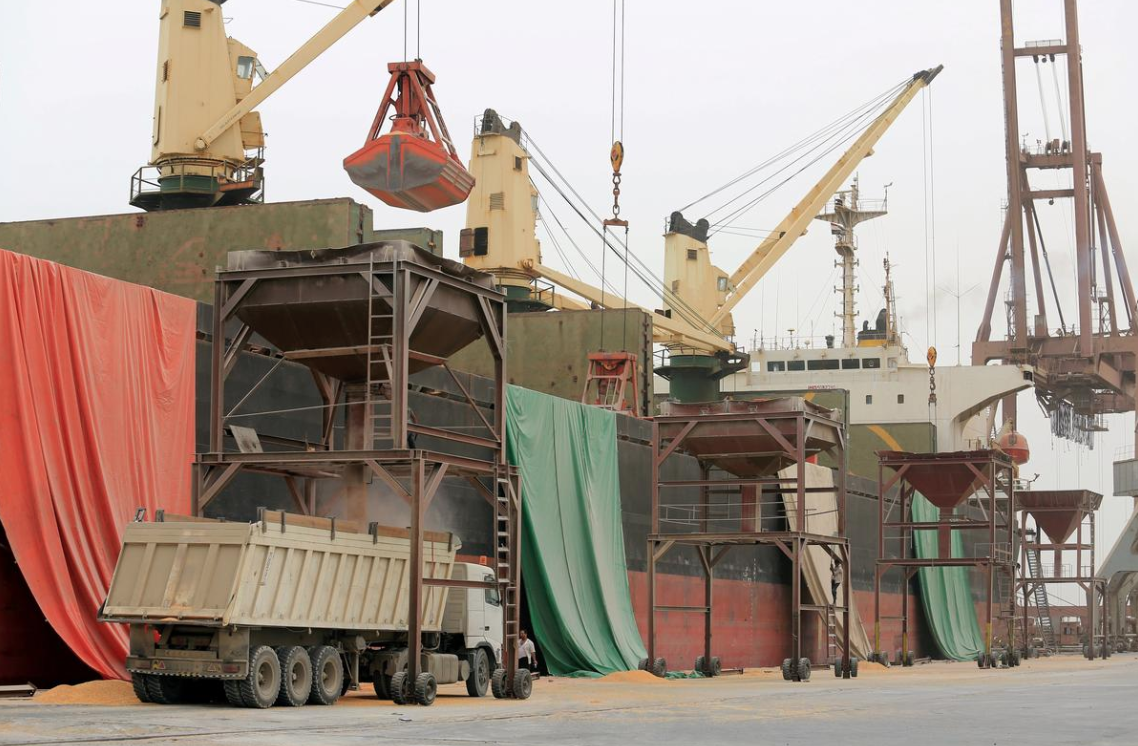Workers at Ain Sokhna Port returned to work last week, bringing to an end a two-week strike that resulted in hundreds of millions of dollars in losses for the port’s operator, Dubai Ports World, related businesses and Egyptian authorities.
Labor leaders ended the strike after the government intervened in the dispute, which ultimately established a new company to hire the workers.
Dubai Ports World, an international giant in port operations and shipping, has run into intermittent conflicts with its workers at Ain Sokhna since the company was first contracted to run the port in 2010.
More than once, labor disputes led to the suspension of work in the strategic port for up to two weeks at a time.
But labor leaders say the most recent agreement, brokered by the government, is a quickfix remedy that won’t prevent future conflicts, and is demonstrative of the government’s tendency to submit to big businesses. They maintain that the DP World policy of subcontracting its labor is inherently unfair to workers.
A fragile solution
About 1,200 workers at Platinum Maritime Services, a subcontractor at the port, began February’s strike by demanding permanent contracts with DP World.
By striking, they put almost all of the Ain Sokhna Port operations at a standstill. The port is a regional hub through which many of Egypt’s imported goods from Asia arrive in the country.
Losses climbed to US$500 million in 17 days. This included DP World’s losses, money that would have come from delayed and rerouted shipments that exceeded $25 million daily, lost customs and taxes estimated at LE15 million, and another LE17 million that would have gone to the Red Sea Ports Authority.
Matters escalated when workers began to fear for even their temporary jobs after DP World ended its contract with Platinum Company, a private company responsible for labor supply to DP World.
DP World officials announced during the negotiations that the company would hire a new subcontractor in Platinum’s place. They said the new subcontractor would offer workers fair employment contracts, higher wages and improved benefits.
The company drew a hard line and defended its policy of subcontracting, stressing it is “impossible” for DP World to hire the workers directly.
“DP World has agreed with the new subcontractors [replacing Platinum] to re-hire the workers previously employed by Platinum, but the workers themselves refused the offer and demanded that Platinum continue its work at the port,” the statement read.
But Hany Saeed, one of the workers who attended the negotiations in the presence of representatives from DP and the president’s office, says that after having their jobs jeopardized when the contract with Platinum ended, the workers did not want to find themselves in that situation again.
“We’re not asking for wage increases or any added benefits — we just want to be safe,” he says. “We don’t want to be with another subcontracting company only to find ourselves in the street again in two years.”
The workers reluctantly agreed to go back to their jobs, after a presidential proposal established a state-owned joint stock company, with management holding a 51 percent stake in the Sokhna Port and investors holding the remaining 49 percent.
The agreement ensures the employment of about a thousand former Platinum Company workers.
For the time being, workers have signed short-term contracts directly with the Red Sea Ports Authority, which confirmed that the workers will sign with the new joint stock company once it is established.
A government job
Despite having failed to achieve their original demand of being hired directly by DP, Saeed says workers are happy to escape the disadvantages of contracting companies.
Now, he says, they can enjoy the relative security of a government job.
“After it became obvious through the negotiations that DP had a strong hold on the government and didn’t want to hire us, we said that instead of having a contracting company sucking our blood, we agreed to have the government sucking our blood instead.” says Saeed.
Nevertheless, officials at Sokhna port warn there would likely be aftershocks after the government’s easy acquiescence to both the company’s and the workers’ demands.
He says the labor unrest at Sokhna could spread to other Suez ports and East Port Said Port, leading to a complete paralysis of the Red Sea ports.
Seoud Omar, a labor activist in Suez and consultant for the regional union for independent syndicates that has been advising the DP workers, believes the government’s solution not only fails to solve the initial problems, but actually violates Egyptian and international laws.
“The main issue remains the subcontracting of workers,” he says.
Egyptian law forbids the subcontracting of workers to do the main activity of the company, which is the case for the subcontracted DP workers.
Omar says the agreement does nothing to address the unfair differential treatment that subcontracted workers received as opposed to their counterparts, who are contracted with DP directly.
Both Egyptian and international laws state that workers who do the same work in a company must be paid equal wages.
Saeed describes the treatment subcontracted workers received from DP.
“The DP workers sit while we do all the hard work, and if one of us gets injured, they fire him, while if it’s one of them, they’ll treat him,” he says.
Because of the nature of the work, which entails heavy lifting, neck and back injuries and chronic conditions among workers are common, and fatal accidents on the job sometimes occur.
Workers don’t get compensated for danger, Saeed says, except for collective insurance. Nor do they receive benefits such as pensions and end-of-service bonuses.
“I was with Platinum for five years and got out with nothing, and was with another contracting company for three years before that. How many more years should I waste of my life?” he says.
Omar says that to end the continual reigniting of strikes in the port and in Egypt in general, the whole relationship between employers and workers has to change — through laws and accountability that protect workers’ rights, not bend to company’s interests.
“Any labor relation that isn’t fair is reason enough for explosion. It’s almost a mathematical equation. Experience tells us that even the most submissive labor forces eventually erupt when injustice persists,” he says.
‘Hostile to labor rights’
Labor experts maintain that DP World, which operates ports in 31 countries, uses its clout and economic power to keep its workers under its thumb.
“DP is hostile to labor rights,” says Omar, adding that the company has been blacklisted in international labor syndicates and kicked out of some countries, including Yemen and Saudi Arabia.
With a monopoly in the region, Omar says the company goes to great lengths to minimize its spending on wages.
Despite its brazen workers’ rights violations, he says, the Egyptian government has proven unwilling to challenge the company.
During a 2011 strike, DP World rejected workers’ demands that they receive a 10 percent profit share guaranteed by Egyptian law. It also refused to change the labor structure in the company to allow more mobility for workers who spent years in the same position.
Two more strikes took place last year, revolving around the same demands.
Each one ended with false promises from DP, and the workers’ demands remained unmet.
Last year, DP fired seven employees who were leading the strike movement and filed an official complaint against the workers for inciting strikes.
Mohamed Abdel Ghany was one of the workers fired last year.
He believes the government supported DP World when it fired him by putting a stop to the sit-in his colleagues had begun to oppose his sacking.
Presidential consultant Mohamed Fouad Gadallah ended the sit-in that their colleagues started in solidarity by promising the workers that their fired colleagues would be investigated, and those who were proved innocent of any wrongdoing would be reinstated.
No such investigations ever took place.
“The Egyptian government in [Hosni] Mubarak’s era was a partner in corruption. In Morsy’s era, it is unwilling to fight it,” he says.
Little to bargain with
Many factors seem to give DP the upper hand in its negotiations with the Egyptian government.
During the most recent strike, DP World threatened to close all Sokhna port operations if the sit-in proved to be a tough economic blow for the country.
Additionally, DP has a monopoly on the port business in the area, which minimized the pressure on it to respond to demands.
Omar attributes the government’s accommodating actions to its desire to improve relations between Egypt and the United Arab Emirates. DP World is directly linked to the royal family in the Emirates.
But if the government continues to accommodate DP World at the expense of the workers, or fails in establishing its new subcontractor, future strikes and labor unrest could lead to massive economic losses.
Many shipping companies, experts say, have already begun re-routing their ships to safer harbors, and away from Ain Sokhna.




